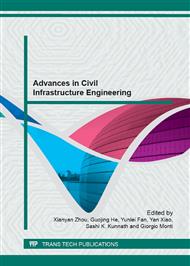p.304
p.309
p.313
p.319
p.325
p.329
p.334
p.341
p.346
Carbonation Experimental Study on Thermal Insulation Glazed Hollow Bead Concrete
Abstract:
Based on the compressive strength, the thermal conductivity, the elastic modulus and the steel bond strength of thermal insulation glazed hollow bead concrete, referring to the carbonation mechanism and the influence factors of the ordinary concrete, considering the impact of raw materials and the influence of construction technology, the study on thermal insulation glazed hollow bead concrete anti-carbonation was proposed. From the test results, it can conclude that for the same intensity level, the anti-carbonation capacity of the thermal insulation glazed hollow bead concrete is better than that of the ordinary concrete. For different strength grade of thermal insulation glazed hollow bead concrete, to some extend, the higher the intensity level is, the stronger the ability of thermal insulation glazed hollow bead concrete anti-carbonation is.
Info:
Periodical:
Pages:
325-328
Citation:
Online since:
January 2013
Authors:
Keywords:
Price:
Сopyright:
© 2013 Trans Tech Publications Ltd. All Rights Reserved
Share:
Citation:


